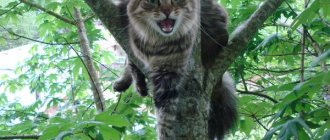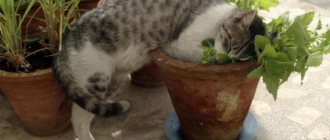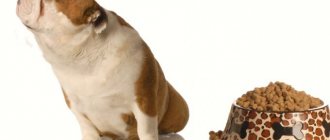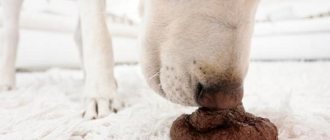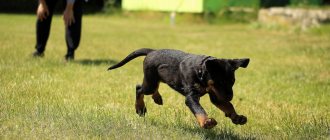Young dogs are the most inquisitive pets. If it is enough for kittens to simply smell an unfamiliar object, then puppies must definitely taste it. But sometimes curiosity persists until a very advanced age.
In such cases, the owner is perplexed for a long time why the dog eats soil on the street or from a flower pot, and sometimes tries to swallow completely inedible-looking stones. There are several explanations for this behavior, and some of them are quite dangerous.
Reasons why dogs eat soil
The reasons for this behavior begin with harmless curiosity. And they can result in chronic diseases and mental disorders. Each reason is worth considering in more detail.
Bad food
It is not uncommon for dogs to eat grass, twigs, or leaves. And this, first of all, is the call of their body. Dogs can sense and understand what nutrients they lack to be healthy. If a dog's diet does not contain enough vitamins and nutrients, it will seek them out on its own. The main elements that animals find in the ground are calcium, iron and carbon.
Chronic diseases
Infection with helminths, which has become a chronic disease, may be the reason why a dog eats sand, earth, and stones. The animal tries to expel parasites from the body by any means.
Such tasty dirt
Curiosity and exploration of the world around them often leads puppies to taste everything.
They chew, lick and try to eat everything. That is why the puppy eats soil, clay, sand and much more outside or in flower pots. On a note! Often a dog digs and eats the soil in search of a buried fish bone or sausage string. Such a small “yummy” makes you eat it along with soil particles.
Problems of education
Pets, deprived of love and attention, try to attract their owner to themselves by eating the ground. Both small children who commit pranks and pets thus show a lack of communication.
Stomach upset
Inflammatory processes in the stomach and intestines force animals to look for medicine around them. As with helminths, pets will try various remedies to dull the pain and eliminate the disease.
Important! If gut health problems are left unattended, they develop into mental disorders. In this case, the dog will eat the soil unconsciously.
Depressive state
Alarming symptoms of decreased activity, indicating a depressive state of the animal:
- Whines monotonously.
- Refuses to respond to other dogs or goes into conflict for no apparent reason.
- Gets tired quickly and does not respond to the owner's commands.
- Repetitive motor patterns (tail circling, regurgitation of food followed by swallowing).
- Loses neatness skills.
- Not trainable.
Dogs react poorly to changes in family composition, moving, new people in the house, updating the interior or climate. If there are no such reasons for depression, and behavior does not change for a long time, you should look for the source of the problem in diseases of the internal organs, metabolic disorders or endogenous disorders.
Treatment and prevention of depression in dogs
Method for diagnosing the causes of the disorder
Once you notice the earth in your pet’s mouth, you should understand exactly how it got there. There are three reasons for this behavior:
- A dog may accidentally eat dirt along with grass. All pets eat greens, as they cleanse the intestines, help the stomach function, and replenish vitamin reserves. If a dog eats grass and a small amount of soil gets into its mouth, this is not critical.
- Dogs can eat soil while playing with a ball, a stick, or simply dig the soil with their paws and swallow it. If this does not happen often, you should not punish the dog for this behavior.
- If, on a walk, a dog purposefully goes out to eat dirt, this should arouse suspicion.
There is no need to analyze behavior based on a single case. You should observe your pet for several days and understand why he is doing this and what he needs.
Along with the grass, earth can also fall into the mouth.
Behavior problems
People have strange habits due to stress and boredom - hair curling, cracking joints, overeating, etc. The same applies to our pets, who are designed for active activities and outdoors, and who do not always get everything they need. them stimulation.
Imagine a large working dog that sits at home alone all day... He will probably find a way to amuse himself, perhaps by eating dirt.
Some dogs, especially young ones and puppies, may simply eat dirt out of pure boredom. This can be due to a variety of reasons such as lack of exercise, lack of kennel time during the day, lack of play time or lack of proper social interaction. Remember that dogs, like people, need exercise and daily goals, especially when it comes to herding and high-energy breeds. In general, dogs enjoy work, so if your dog's behavior seems out of character, give him something to do.
Just like humans, dogs can also have obsessive-compulsive disorder (OCD). A dog with OCD may begin to consume dirt as part of the disorder. If you suspect OCD or a related behavior disorder, consult your veterinarian or animal behaviorist.
Why is it dangerous for a dog to eat soil?
The dangers of regular use of soil can entail:
- Infection with helminths. Almost the entire range of helminths and their eggs can be found in the ground.
- Inflammatory processes of the intestines. Various garden fertilizers contain growth stimulants. Such substances irritate the mucous membranes and can lead to inflammation.
- Mechanical damage to the intestines. There are pebbles, glass, and branches in the soil. These piercing and cutting residues can damage your pet's intestines and lead to bleeding and inflammation.
- Digestive problems. Large portions of earth create plugs in the intestines, which lead to disruption of digestion and gas formation. The soil in a dog's stomach is not digested.
The longer you ignore your pet’s bad habits, the greater the likelihood of developing chronic problems with his health.
Important! The problem of dogs eating soil is common, but the serious consequences of this phenomenon should not be underestimated.
The top layer of soil is a source of helminths
Answer
Owners of dogs with extremely sharp teeth often encounter this difficulty. In search of an object to sharpen, a dog (puppies often do this) attacks:
- Crushed stone;
- Cement;
- Coal;
- Ash;
- Concrete;
- Sand.
Home furniture is included in the list of damaged items. However, sand, stones and concrete will certainly harm a dog’s stomach, injuring the walls of its organs. Pebbles help birds grind solid food in the stomach; stones are contraindicated for dogs.
Often the dog not only sharpens his teeth, but takes stones into his mouth, sometimes swallowing. For the owner, the phenomenon becomes an alarm bell; from swallowing such things, the dog’s stomach is not in the best condition. If the puppy lacks mineral elements, the dog begins to chew on solids.
If you do not notice the situation in time, the dog’s development will move in the wrong direction.
What to do
The first step in solving the problem should not be aimed at forcibly weaning and punishing the four-legged animal. Solutions to the problem that you can do at home:
- Improve the dog's diet. You should add fruits and vegetables, bone meal, and chalk to your food. A vitamin complex will also not be superfluous for the dog.
- Unscheduled deworming will give results within two weeks.
- If your dog eats soil from flower pots during the winter, you can plant pet grass in the pot and your pet will switch to eating greens rather than soil.
If after 10-14 days there are no results, and the dog continues to eat soil as before, you should contact a veterinarian. Tests and examination will show the true reasons for this behavior.
A specialist will help determine the true cause.
Anemia
The causes of anemia are too numerous to mention here and deserve their own page. An anemic dog may eat soil to find more resources to cope with the anemia and get better. They will feel terrible and if they haven't been to the vet for a while, they may become desperate.
Anemia is like bad dog food because it sets your dog on a path fueled by the desire to seek something he won't get anywhere else.
To check if your dog is eating dirt due to anemia, check to see if his gums are less pink and more white.
How to wean
It is not easy to wean a dog from a conscious or unconscious habit. Along with the above weaning methods, it is important to implement the following. While walking, you should not scold or punish the dog; it is important to scare it away or distract it from eating the soil. This can be easily done by clapping your hands, you can whistle, but so that the dog does not determine the “source” of such a sound. If your puppy is eating dirt, it is easy to distract him with his favorite toy.
Important! During the walk, you should devote all the time to playing or training.
Who is susceptible to pathology
More often this happens with puppies, not only German Shepherds, aged 2 to 3 months. Males and females are susceptible. Raising a puppy is a difficult process. Whims and illnesses are quite normal, the main thing is to pay attention to the violations in time.
By the way, if the dog is no longer a puppy, a perverted appetite can be a symptom of rabies.
The described violation is less relevant to people who regularly feed their dogs animal food. For example, minced meat purchased from a farm. In this case, the meat is ground directly with the bones of the killed animal, and the dog receives double benefit.
Try to feed your animal food designed to improve bone structure, and provide the diet with vitamins.
Diseases caused by eating soil
Serious complications that can arise as a result of constantly eating soil:
- stomach upsets;
- failure of the intestines;
- hormonal disbalance;
- kidney dysfunction.
Do not neglect the bad habits of pets. It is important to monitor their behavior and health. If you cannot eliminate the cause on your own, you should immediately consult a doctor. Eating soil can develop into serious health problems. It is important to find the cause and the correct solution to the problem. Then the pet’s health and psyche will be normal.
Boredom
Bored dogs can be destructive and behave strangely, such as eating dirt. Always make sure your dog is moving well and socializing frequently to prevent this behavior. Eating something isn't usually the most common result of boredom, but it's not out of the realm of possibility, and we've seen much stranger things.
Make sure your dog has enough toys in the house and garden to keep them occupied even when there is nothing going on at the time. If you leave your dog outside for long periods of time, make sure he is not sitting idle.
Normal Behavioral Responses
As soon as they begin to crawl, small children begin to put into their mouths everything they can get their hands on. Young parents are horrified, especially if this behavior is observed in their first-born. Families raising a second or third child behave calmer and do not attach much importance to the child’s behavior. As they say, if a child eats cat food, it’s the cat’s problem.
The same can be said about inexperienced “dog breeders”; if the pet is the first, then any deviation in its behavior causes serious concern. However, when a puppy eats dirt, the reason is (most often) obvious:
- Exploring the world around us.
- Expanding the taste range.
- Infection with worms.
- Lack of vitamins or microelements.
In the first two cases, the puppy’s behavior does not need to be encouraged, but it is also useless to stop. Humble yourself and let your child gain his own life experience. If the pet chews black soil with an enviable appetite, digs up the earth and eats a “delicacy” with roots and worms , the reason is not interest, but we will look into this below.
Eating grass on the street is normal, and if your dog pulls out a bunch of treats along with the soil, there is no need to worry. A dog does not have such dexterous fingers as to clear blades of grass from black soil, and a small amount of this “drug” will not do any harm. By the way, vomiting after eating grass is also normal; thus, the dog “cleanses” the stomach and stimulates the digestive system.
Perhaps your pet is seriously interested in house flowers. This phenomenon can be considered the norm in the autumn-winter period. If, while plucking a plant, the dog grabbed some soil from a flower pot, don’t worry, but the pet needs to be “scolded.”
Note! Adapted soils for home flowers may have a pleasant, sweetish smell, which serves as an additional incentive to eat them (especially for puppies).
Gnawing bark and chewing sticks is also normal behavior . In both cases, the pet acts instinctively - it scratches its gums and brushes its teeth. If the dog does not have access to grass (cannot eat it), then bark serves as an alternative. Coarse vegetation is not beneficial to the dog, but it is not harmful either (in reasonable quantities).
Note! Often, a dog swallows soil (or even sand) while playing with a stick, while the pet expressively “spits” and makes grimaces. Don’t worry, a puppy or young dog should be able to clear its mouth of “foreign debris,” and by playing with a stick, the pet will learn to do this.
